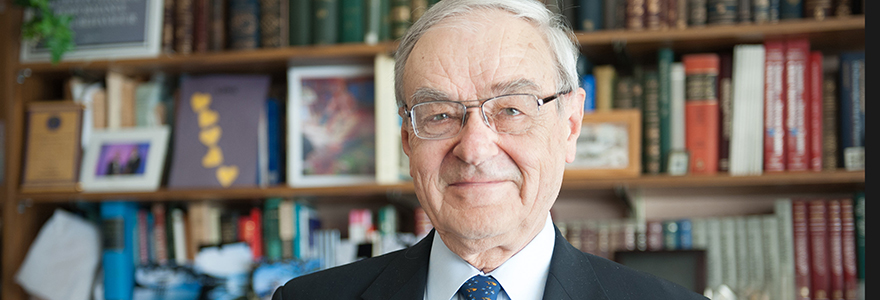Award: Dr. Vladimir Hachinski earns CMA’s top honour for ground-breaking stroke rehabilitation research

Dr. Vladimir Hachinski, Distinguished University Professor in Clinical Neurological Sciences and Epidemiology & Biostatstics was awarded the Canadian Medical Association’s F.N.G Starr Award for his pioneering work in stroke treatment and recovery.
This award is considered the highest distinction that can be earned by a member of the Canadian Medical Association, awarded in recognition of lifetime achievement and outstanding contribution to science and medical service over the course of the recipient’s career.
Early in his career, Dr. Hachinski teamed up with his colleague, Dr. John W. Norris, and they devoted themselves to caring for and studying stroke patients, establishing what would become the world’s first successful acute stroke unit out of Sunnybrook Hospital in Toronto.
At the time, there was no treatment available for strokes. Doctors in the United States had tried to establish acute stroke units, but the lack of successful outcomes soon forced them to close.
Dr. Hachinski and his partner ended up defining a protocol for early intervention complemented by early rehabilitation that remains the standard of care for strokes today.
The other success factor, he realized, was awareness. Taking his lead from previous campaigns on the signs and risks of heart attacks, he coined the term “brain attack” for strokes —reinforcing the urgency of getting medical attention as soon as the warning signs present, instead of waiting until a full stroke occurs.
Dr. Hachinski and his colleagues also identified links between strokes and heart conditions and found that strokes can increase the incidence of certain types of dementia, realizing it may be possible to prevent some people from developing dementia by preventing them from having strokes.
“It’s all connected,” said Dr. Hachinski. “There is no health without brain health, so the importance of funding this kind of research cannot be overstated.”
Today, Dr. Hachinski and his team are looking into the environmental factors that affect stroke risk and are putting together a proposal for funding in hopes of expanding their research and methods.
“During a 12-year period, we saw a 32 per cent decrease in stroke incidence and a 7 per cent decrease in dementia cases in Ontario,” he said. “We would love to be able to isolate the sum of little things that make the biggest difference so we can extend those same results across Canada.”
Dr. Hachinski is extremely humbled to be receiving this prestigious award but notes that he wouldn’t have been able to do any of it on his own.
“Everything I’ve ever done has been plural,” he said. “So, this recognition for me is also recognition for the students and colleagues I’ve worked with and especially the patients who have taken part in the research. I can’t thank them enough for their contributions.”








